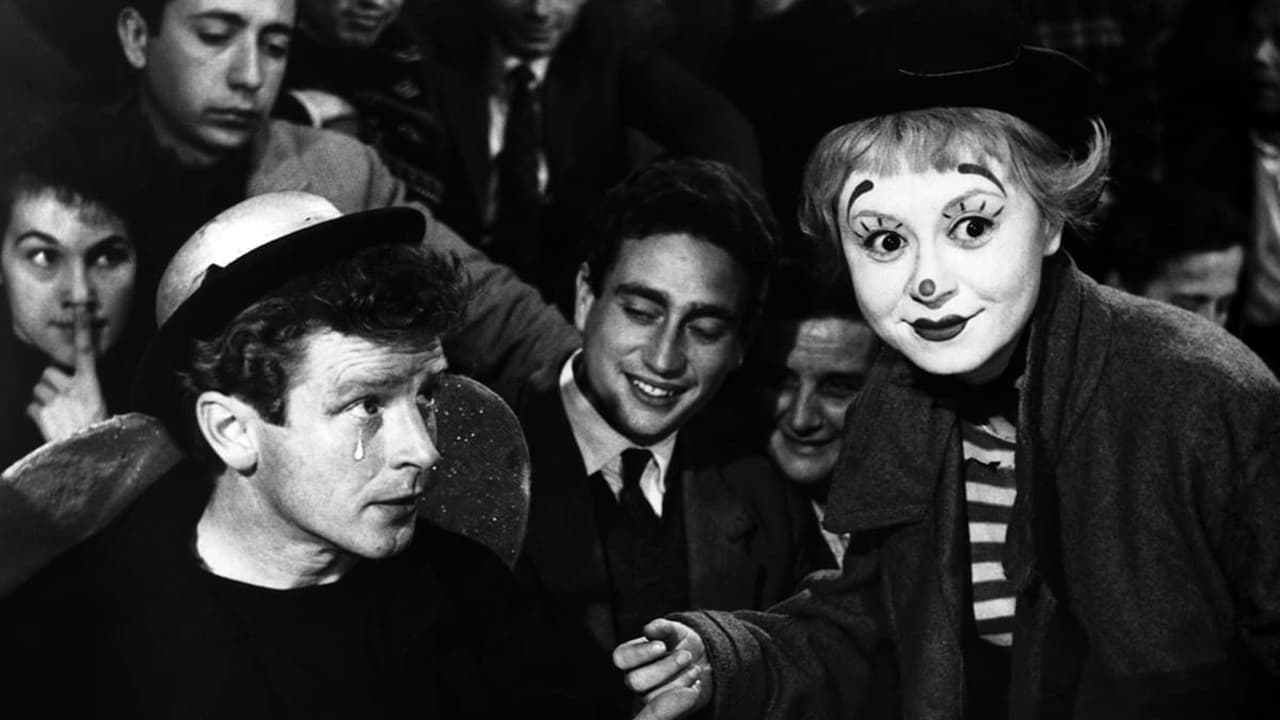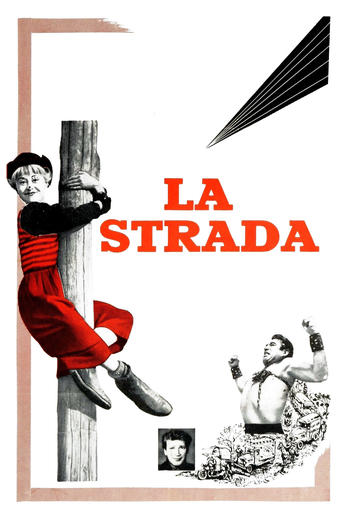

Anthony Quinn who was Cecil B de Mille's son in law told the story of showing La Strada to his father in law. It seems that De Mille couldn't take it. He asked for the projection to be interrupted in more than one occasion. He was disturbed, confused. Maybe it was the simplicity, the total lack of artifice. Let's remember Fellini shot it in the immediate post-war Italy with no means whatsoever and here it was, a masterpiece changing the world of cinema pushing us to a reality that was as pungent as it was poetic. The heartbreaking story of Gelsomina - an extraordinary Giulietta Masina - and Zampano - a spectacular prime Anthony Quinn who plays his humanoid with shattering truth - went to become a global sensation and an Oscar winner. Apparently, after the film was over, Cecil B de Mille got up and left the room without saying a word.
... View MoreFilm Review: "La Strada" (1954)The story of a universal love between two human beings, coming together under most unlikely circumstances, when a mother sells her daughter Gelsomina to a traveling muscle entertainer Zampanó. Together they grow as notorious artist couple of the street to nowhere. Gelsomina & Zampano have only themselves to prevail in this world, meeting many characters along their way, among them violin-playing clown at a circus company. The fool, performed by Richard Basehart (1914-1984), who like no other test the beating-stick proofed relationship of Gelsomina & Zampano, when she realizes that there will be no other man as Zampano in her life, who is able to take care of her without diminishing her free spirit.Director Frederico Fellini (1920-1993) meets his future wife actress Giulietta Masina (1921-1994) in casting with this mainly on-location shot gem of an independent film, when method actor Anthony Quinn (1915-2001) joins the scene as the unforgettable character of Zampanó, originally written by Federico Fellino and Tullio Penilli, who realizes too late that he had everything a man can wish for in favor of self-indulging life of artist of life itself.© 2017 Felix Alexander Dausend (Cinemajesty Entertainments LLC)
... View MoreA whimsical and often magical story that is one of Fellini's more linear and accessible stories. Not only is the warm heart of the story apparent, but the visuals, in typical Fellini fashion, provide striking background imagery.Gelsomina (Giulietta Masina) travels with Zampanò (Anthony Quinn) to earn money. Together they journey and experience various people. Amazing performances especially from Masina coupled with an endearing score. Il Matto (The Fool) provided some laughable moments who meets his fate the last time he meets Zampanò. Simple yet striking screenplay with a sample lines: "For if its useless, everything is useless. So are the stars!" - The Fool. More of an emotional drama that have no direct or structured plot, which lets the viewer wait what happens to the leads. La Strada shows several metaphors such as the nuns (religion), The Fool (humor and realization that everything has a use), Zampanò (greed/selfish desires/loneliness/physically strong yet morally weak) and Gelsomina (a talent never given the spotlight/purity/innocence).
... View MoreLife is a cruel and punishing road that often seems indignant at our audacity for simply walking along it. There are no guaranteed stops but for that ultimate destination, and so how we get there is entirely up to us. Or sometimes not at all. This isn't Cormac McCarthy's vision of The Road of life, in which the entire landscape is enveloped in nihilistic despair, but what McCarthy's road and Fellini's road both share is that the people traversing it have been dealt a meagre hand in life and have to work with what they've been given. The father and son in The Road, despite the post-apocalyptic oblivion that surrounds them, can survive because they have that sacrosanct shield of familial love to protect them. Here, the seed of love between the girl and her master was un-watered, unacknowledged, the cards they were given were misused, often not because of lack of trying but because of a pure inability to grasp them. What Fellini has constructed, like McCarthy in The Road, is a world of which the logistics do not matter, as the greater environment, whether that be an apocalyptic theatre or a or the sparse Italian landscape, simply serves to highlight its characters and their tragedy at its core. I had described this film as conventional, but it is only conventional in the sense that doesn't have these characteristics, and it's not something that you're necessarily deciphering every image. What we have here is a road movie, both literally and metaphysically (yes? The metaphysical road? Yeah, you know what I'm talking' about) in which is immediately accessible because the emotion is so palpable. I was mentioned in my Drive review the weight of physical acting, and how that often bridges the divide between film and audience just as effectively as dialogue does, and that really applies here. Gelsomina, played by Giulietta Masina, Fellini's wife, is such a wondrous presence; her waifish frame, the round face that is like a fishbowl in which we see all manner of emotion flicker by, and the naïve way in which she clowns about, both tentative and joyed is such a sympathetic synthesis that I'm surprised as to how I hadn't actually discovered this character before watching this film, and it seems that is generally agreed that she is something of a female counterpart to Chaplin. She has one of those readily iconic faces, and when she dons her clown make-up she wears these sharp vertical eyebrows that seem to exaggerate her already widened eyes, and throughout the film it is easy to get lost in both the humour and the sadness of them.Gelsomina is part of a large rural family that lives by the seaside, and in the opening shot she frolics at the shore, surrounded by a gaggle of playful children. Life seems fairly simple, and then the rugged and imposing Zampanò (Anthony Quinn) turns up, and buy Gelsomina from her mother for 10,000. The whole film carries that neo-realist edge, a world of social struggle, as it seems Gelsomina's mother is financially burdened, as we learn that she has already sold a daughter, named Rosa, prior to this arrangement. Apparently Rosa died. We are never explicitly told how or why, but it is easy to speculate, as we see Zampanò who light up a cigarette, all hulking physicality, as he waits to carry of this young girl away from her family forever, and as we soon learn the full extent of his brutality. Zampanò is a man who only seems to be able to communicate through his harsh physicality, through which he lives his entire life. He is a street performer, who only has one small novelty act, in which he tightens a chain around his chest and breaks its grip by a powerful exhale. He lives by rote, a simple creature who can easily break physical barriers but isn't capable of breaking emotional ones. As the movie progresses, it seems to almost fluctuate between different rhythms, at some points a comedic routine as when Zampanò tries to teach Gelsomina how to perform her simple musical duties with a drum and trumpet, in which she approaches with innocent wonder, and other points the feeling is quite sparse, with long stretches of sadness. I suppose it reflects the metamorphosing of their relationship, growing but never settling because it never has the chance. Gelsomina is ultimately something of a cipher, she seems slow-witted, her eyes flit about with wonder, she takes delight in learning the simplest of things, yet when she speaks she has something of a wiser understanding about her, and I wonder if her clownish innocence isn't something more calculated, perhaps because it is only through this approach that she feels safe enough to interact with the world. But then maybe this is the tragedy of the characters, as they cannot quite reconcile their outward persona with something more sensitive inside; amorphous and flickering between two states. The Fool, who we later meet, played with wonderful exuberance and passion by Richard Baseheart, is the classic fool, who comically strides around at mocks people at his leisure, often cruelly, which is ultimately his downfall, but beneath that is a wisdom and understanding that he rarely shares. "I don't know for what this pebble is useful but it must be useful. For if it's useless, everything is useless. So are the stars!" He encourages Gelsomina to understand her own potential as a person, and is the one perceptive enough to recognise the bond between her and Zampanò. But Zampanò is the final tragedy, a brute with a love he could not begin to articulate or even recognise, and when he finally breaks down and cries on the beach, a place which seems like the end of the world, it hurts because like the other characters he understands when it is already too late, and now there is no more road left on which to travel.
... View More